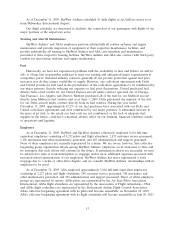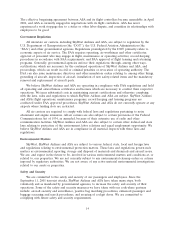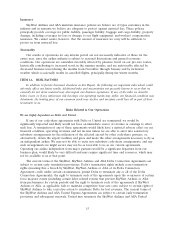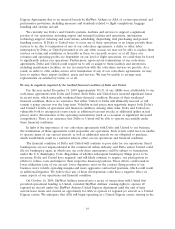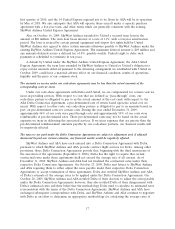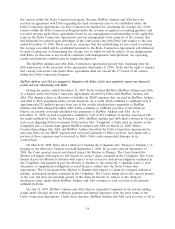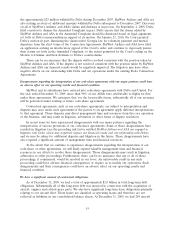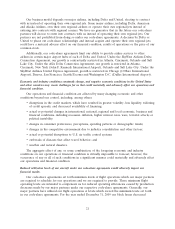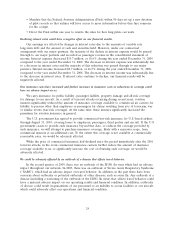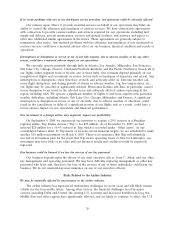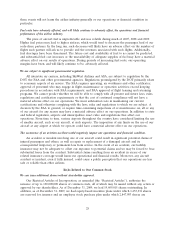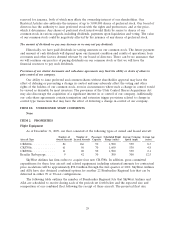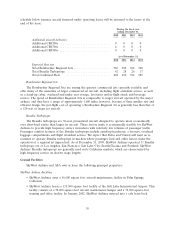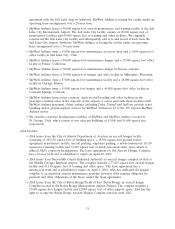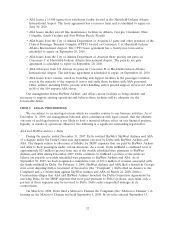SkyWest Airlines 2009 Annual Report Download - page 27
Download and view the complete annual report
Please find page 27 of the 2009 SkyWest Airlines annual report below. You can navigate through the pages in the report by either clicking on the pages listed below, or by using the keyword search tool below to find specific information within the annual report.If unionizing efforts among SkyWest Airlines’ employees are successful, we may be subjected to
risks of work interruption or stoppage and/or incur additional administrative expenses associated with
union representation.
If we are unable to reach labor agreements with any current or future unionized work groups, we
may be subject to work interruptions or stoppages, which may adversely affect our ability to conduct
our operations and may even allow Delta or United to terminate their respective code-share
agreement.
We have been adversely affected by increases in fuel prices, and we would be adversely affected by disruptions
in the supply of fuel.
Dependence on foreign imports of crude oil, limited refining capacity and the possibility of
changes in government policy on jet fuel production, transportation and marketing make it impossible
to predict the future availability of jet fuel. If there are additional outbreaks of hostilities or other
conflicts in oil-producing areas or elsewhere, or a reduction in refining capacity (due to weather events,
for example), or governmental limits on the production or sale of jet fuel, there could be a reduction in
the supply of jet fuel and significant increases in the cost of jet fuel. Major reductions in the availability
of jet fuel or significant increases in its cost, or a continuation of current high prices for a significant
period of time, would have a material adverse impact on us.
Pursuant to our contract flying arrangements, Delta and United have agreed to bear the economic
risk of fuel price fluctuations on our contracted flights. We bear the economic risk of fuel price
fluctuations on our pro-rate operations. As of December 31, 2009, essentially all of our Brasilia
turboprops flown for Delta were flown under pro-rate arrangements while, approximately 47% of our
Brasilia turboprops flown in the United system were flown under pro-rate arrangements. As of
December 31, 2009, we operated 14 CRJ200s under a pro-rate agreement with United. On
November 4, 2009, we entered into a code-share agreement with AirTran. Under the terms of the
code-share agreement, SkyWest Airlines has agreed to operate five CRJ200s for AirTran under a
pro-rate arrangement. As of December 31, 2009, we operated two CRJ 200s with AirTran. We
anticipate that SkyWest Airlines will add three additional aircraft in early 2010. Our operating and
financial results can be affected by the price and availability of jet fuel. Due to the competitive nature
of the airline industry, we may not be able to pass on increased fuel prices to our pro-rate customers
by increasing fares. Fuel prices are volatile, and changed since 2007.
The Airline Safety and Pilot Training Improvement Act of 2009 could negatively affect our operations and our
financial condition.
Prompted by the crash of a Colgan aircraft, which killed 50 people near Buffalo, New York,
passengers and governmental authorities have raised questions about pilot qualifications, training and
fatigue. The Airline Safety and Pilot Training Improvement Act of 2009 was introduced in the United
States House of Representatives and, as of the date of this Report, was under consideration by the
United States Senate. If adopted in the manner currently proposed, the Airline Safety and Pilot
Training Improvement Act of 2009 would add new certification requirements for entry-level commercial
pilots, require additional emergency training, improve availability of pilot records and mandate stricter
rules to minimize pilot fatigue.
The Airline Safety and Pilot Training Improvement Act of 2009 would also:
• Require that all airline pilots obtain an Airline Transport Pilot license, which is currently only
needed by captains.
23


